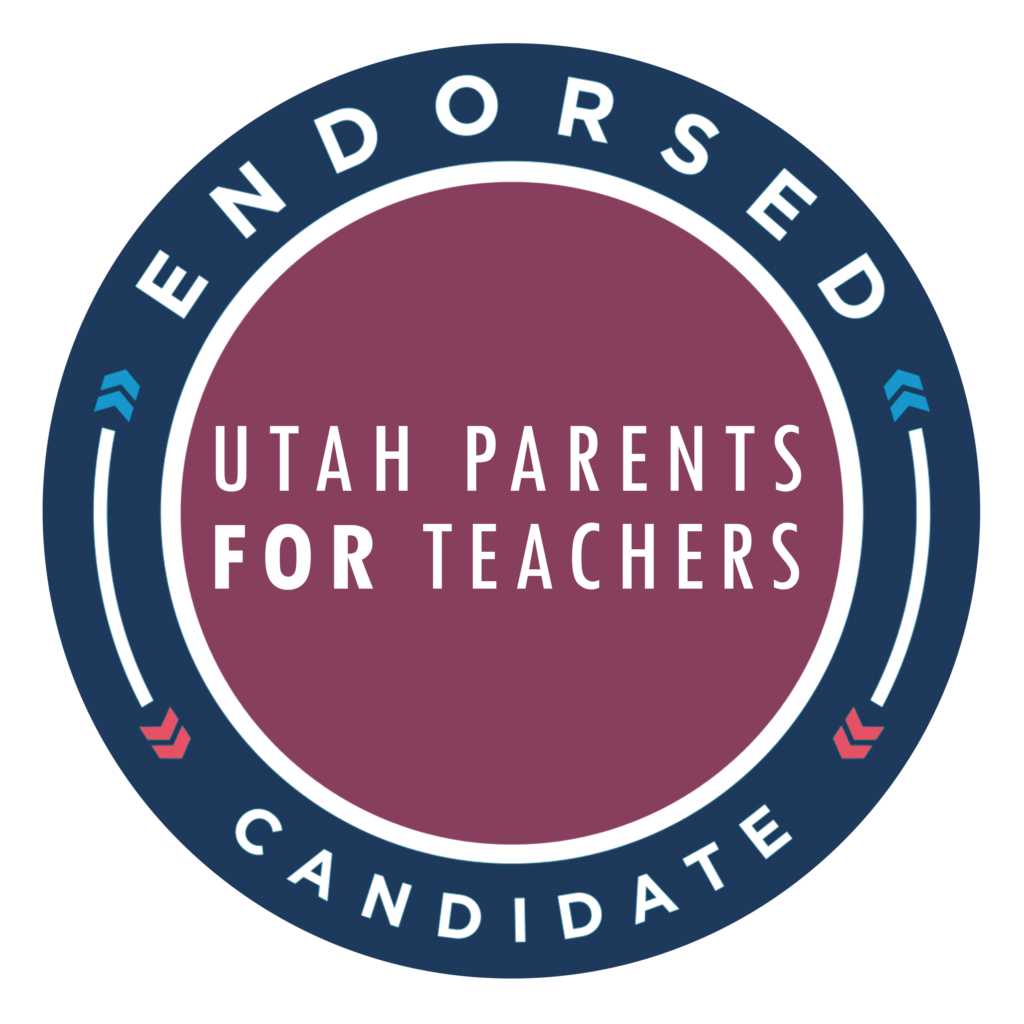I’m proud to share that Utah Parents For Teachers has endorsed my campaign! Investing in public education, and actively supporting our educators and students are in the best interest of our community.

For transparency, I am providing my answers to a survey from Utah Parents for Teachers so that my positions on these questions can be shared with constituents.
Q1: Your name and the office you are running for:
Greg Green, HD44 House Representative
Q2: If you are currently serving in office, how are CURRENT teachers a consistent part of conversations regarding education policy? If you are not currently in office, how do you plan on making sure teachers are part of your learning when it comes to educational policy in the future?
I’m not currently in office. The first step is for democratic candidates to successfully campaign up and down the ticket to replace USBE board members to restore reasonable oversite for Utah schools.
Q3: If you are currently serving in office, how did you vote on HB215 (vouchers) and why did you vote that way? For everyone, what is your position on increasing the number or amount of vouchers?
I’m not currently in office. I would have voted no for vouchers, and I will categorically state that vouchers work against a free public education system. The particular issue I had with HB215 was the “compromise” of offering salary for educators as a gimmick to gain support. We need to fund our educators, and I will work to promote that, but I don’t believe the compromise in this bill was beneficial. See HB215 https://le.utah.gov/~2023/bills/static/HB0215.html
Q4: What is your position on the current book banning that is happening in all school districts in Utah? What is your position on the bill by Rep. Ivory is proposing that will lower the threshold to ban books statewide to 2 school districts or 5 charter schools causing a small minority to control what is banned statewide?
I am 100% against book banning. Period. You can see my comments about this on my campaign site at https://utah44.com/issues/. You can also see my post at https://utah44.com/a-utah-reading-list/ about response to Utah Parents United. It’s worth mentioning that I have my own Little Free Library charter specifically to make banned books available in the community. Regarding Ken Ivory’s bill HB29 https://le.utah.gov/~2024/bills/static/HB0029.html, he attempts to define “sensitive material” as constituting “objective sensitive material or subjective sensitive material”, he expands the definition beyond library materials, and unnecessarily apportions review to school boards. Contrast that with the quote “A truly great library contains something in it to offend everyone.” from librarian Jo Godwin. We don’t need to be banning books, we need to create more classes in critical thinking and encouraging debate. We need to be funding educators and librarians. We need to offer safe spaces for students to grow into adults with the capacity to think for themselves and make educated, reason-based decisions.
Q5: How do you define CRT and do you believe it is currently being taught in Utah public schools? Do you also support AP African American Studies courses being developed in high schools? If so, why? If not, why not?
CRT is Critical Race Theory, which argues that historical patterns of racism are ingrained in law and other modern institutions. It is generally understood that CRT is not taught in K-12 settings, rather is part of higher education programs. “CRT” has been used recently for a word-soup of acronyms, with the intent to get the public thinking that all are the same, and that all are bad. This is broadly an attack against diversity and equity in our public schools. I’m fighting against the USBE attempt to repeal of Educational Equity Rule – R277-328 (we won by only 1 vote this week, see my letter at https://utah44.com/letter-vote-against-repeal-of-educational-equity-rule-r277-328/), and also against the UT GOP RESOLUTION IN SUPPORT OF REPEALING R277-328 AND ALL CRT PRAXIS IN UTAH SCHOOLS (https://utgop.org/wp-content/uploads/2023/11/Oct-28-2023-Resolution-in-Support-of-Repealing-R277-328-and-All-CRT-PRAXIS-in-Utah-Schools.docx.pdf).
Q6: How often do you meet with local school board members? How often do you meet with teachers/administrators/classified personnel? How many town halls/public meetings have you had since last legislative session? (If not currently in office, what are your plans for this?)
I have 3 adult kids who graduated from the Utah public education system (last in 2019). I have not recently attended local school board meetings but was an active participant in the response to Jordan District’s 2021 attempt to force consolidation of local special education classrooms (see https://utah44.com/letter-all-students-belong-in-all-utah-schools/). Regarding plans to engage constituents if elected, my thoughts have been to host moderated “listening parties” to hear from the public on matters important to them, and supplement that with quarterly local town halls within the House District for accessibility. I’m still figuring out what this will look like, but this is the general idea.
Q7: What ideas have you formulated that will increase public school funding to keep up with growth, fully compensate teachers for their expertise and commitment to teaching, ensure they have the classroom resources they need to be effective educators, and making teacher retention a priority?
In 2024 I think the first issue is to look at proposals to do away with income tax, which would disproportionally shift the burden of taxes to property and sales taxes. Utah’s Constitution requires income tax revenues to only be used for public and higher education and some social services for disabled residents, so the question is how and where funding would continue to be sourced for education. I would support higher earmarking for education funding. Regarding classroom resources and teacher retention, I think this needs to be addressed in legislation AND in campaigns to defend our public education system and challenge the rhetoric of conservatives that disrupt and dismantle education standards, funding, and outcomes of our public school system.
Q8: What are your short and long term plans to address school age population declines, shifts and increases (due to limited housing options for young families, less children being born per family, etc.)? With Utah spending the LAST per pupil in the nation, how can funds be allocated to increase spending per pupil and make it more equitable for rural school districts as well?
I already spoke about the serious funding issue for schools in the question above. Demographically Utah has some of the youngest counties in the nation (https://www.axios.com/local/salt-lake-city/2023/06/26/utah-young-us-median-age-county-cache), so it’s not appropriate by any means that we spend so little. I need to learn more in this topic, but initially some things that I believe would help include Medicaid expansion in the state to provide better health and support services, tackling the rhetoric in the legislature and working with the Governer’s office to grow funding, working with education councils and associations, and more. On a side note, it would be interesting if the proposed 2024 bill from Rep. Kera Birkeland on a constitutional amendment to legalize lotteries in Utah could become a source of funding for education in Utah. I am really interested in seeing this legislation introduced (it has not yet been submitted effective Jan 13, 2024).
Q9: If budget was not a concern, what 3 things would you tackle in education? What steps are you taking now to address those issues?
More than 3, sorry.
- Change the USBE Board of Director positions to non-partisan/apolitical positions
- Provide explicit direction for recall of USBE board positions when persons are materially working against interests of a free public education
- Fund our educators, provide funding for professional development, provide funding for paras, provide funding for libraries, offer qualified reimbursement to teachers for supply purchases for classroom materials.
- Provide visible support and expansion of Unified Schools programs that include mainstreaming, clubs, leadership development, and athletics
- Broadly implement Social Emotional Learning (SEL) policies in K-12 public education
- Restore a science-based nonjudgemental sex education program that is not based on abstinence-only
- Expand post-secondary University certificate programs for students with IDD (i.e. Aggies Elevated, Wolverines Elevated, etc)
Q10: What ways can we support diversity in our curriculum so that all students see themselves as culturally relevant?
- Stop banning books
- Remove policies that set cultural standards on hair and clothing
- Report discrimination and abuse, and ensure escalations to investigative or prosecutorial agencies takes place. Hold administration accountable.
- Encourage roles for diversity for Student Body Officers (i.e. chief diversity officer)
- Stop the re-writing of history for our students.
- Offer civics and history classes on african-american studies, Latinx, Disability legislation, and the Pride movement
Q11: What have you personally done to support teachers/public education?
- Letters written, and attendance at school board, district, or state USBE meetings setting policy or addressing critical issues
- Participation in groups like “We All Belong Utah – All Abilities, All Schools”
- In-school volunteering, past mentor/counselor for the South Jordan Youth Council
- Sponsored and participated in school supply drives at work, participated in school supply drives in the community
- Participation during Junior Achievement Career Days by speaking to, or bringing my daughter (Special Olympics Global Ambassador) to speak to Special Education classes on personal story and transition for students with disabilities. Special Education is typically not engaged in Junior Achievement Career Day programs
- Supporting my daughter Natalie as a Special Olympics Utah Global Ambassador and Special Olympics US Youth Ambassador for Unified Champion Schools.
- Recognition for teachers during teacher’s week in the school year
- We funded two special education scholarships through Jordan Education Foundation in memory of Cindy Chavez, a para-educator for our daughter who passed away.
- Invitations and outreach to teachers/classes/teams to attend Best Buddies Friendship Walks, Special Olympics events
- Sponsoring “Spread the Word: Inclusion” campaigns at Jordan District Schools
Q12: How will you show your commitment to public education outside of your role as an elected official?
By continuing to do what I do. I will maintain engagement with school programs, and if elected will actively sponsor and/or support legislation that defends free public education in Utah.
Discover more from Utah House District 44
Subscribe to get the latest posts sent to your email.
